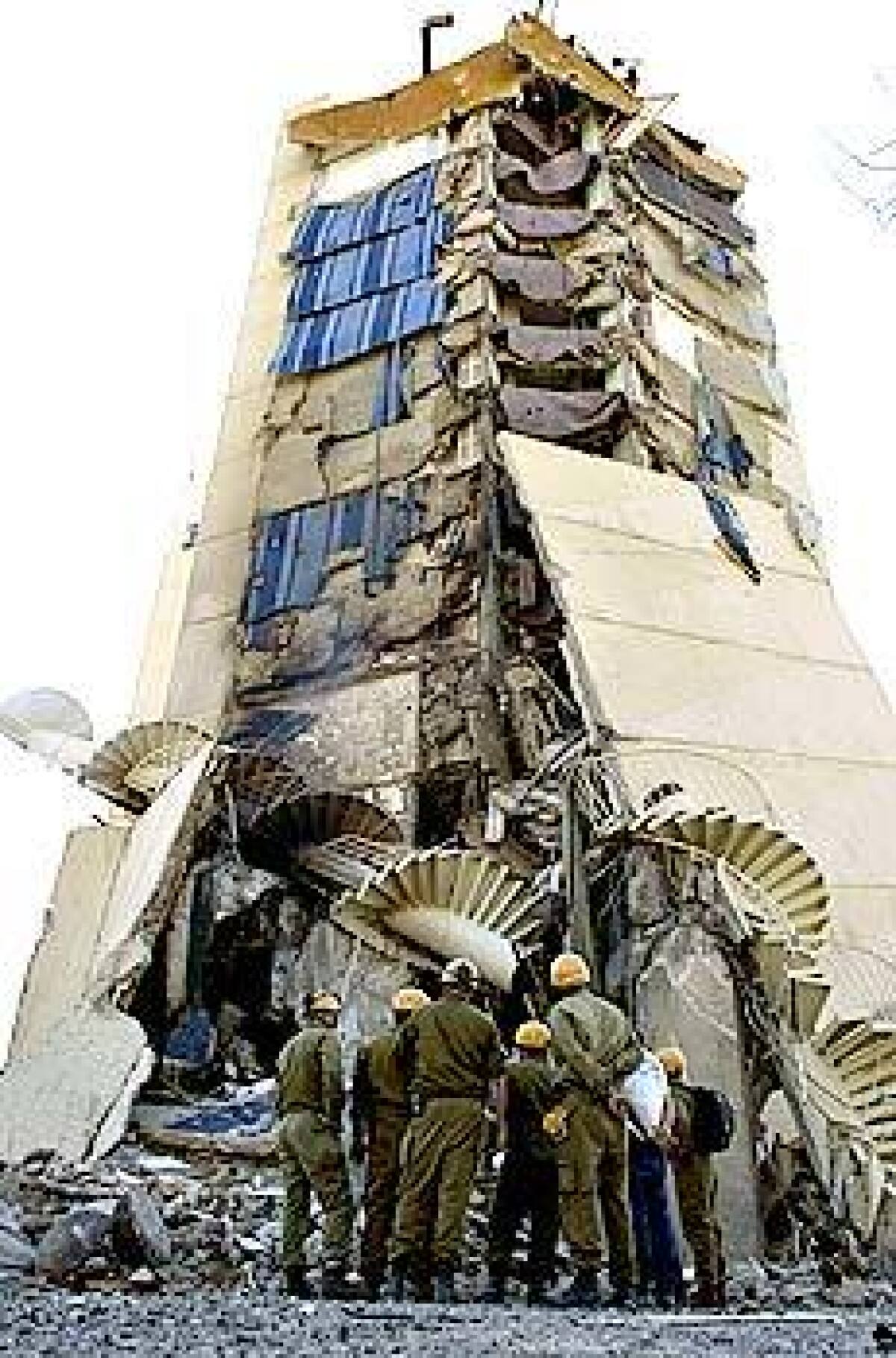Israelis Flee Bomb-Devastated Taba

Like some bedraggled, resort wear-clad version of the Israelite exodus from Egypt, Israelis fleeing the bomb-devastated vacation village of Taba formed a long line at the border today, with sleepy, bewildered children piggybacked on their shoulders.
More than 10,000 Israelis were thought to have been on vacation in Egypt’s Sinai Peninsula when it was hit Thursday night by a synchronized series of bomb attacks that left at least three dozen dead. Israeli officials quickly advised their compatriots to come home.
Few needed any urging.
Sarah Varshaviyak and her husband, Elimelich, both in their 60s, had been staying for the past several days at the Taba Hilton. They were out to dinner at a nearby restaurant when a car bomb shattered the Red Sea resort complex about 10 p.m. Thursday.
“We saw that the hotel had just disappeared, up to the 10th floor,” said Sarah Varshaviyak. “Then we realized our room, 901, was gone. Probably our car is gone as well, because it was parked just under the hotel” — a wing of which collapsed in the massive blast.
The Varshaviyaks crossed back into the Israeli resort town of Eilat, just across the border.
“The main thing is we are OK,” she said. “And here in Eilat, people took care of us in the most kind and lovely way.”
Hotels in Eilat opened their doors to fleeing vacationers and bomb victims, setting up rows of mattresses in their banquet rooms and meeting halls, where exhausted children slept cheek-to-cheek in the early hours of Friday.
The refugees were a mix of middle-class families who had been on holiday at the child-friendly Taba Hilton, with its Red Sea beach and water park, and the free-spirited, long-haired hikers and backpackers who had been staying in the more remote reaches of the desert peninsula.
“I was so scared — when you’ve got little children, you’re scared for them,” said Tovi Avnon, cradling her 4-year-old son Ido in an Eilat hotel banquet hall that was still festooned with décor from a wedding that had taken place days earlier.
Her 11-year-old son, Roi, described the scene in the lobby of the Taba Hilton when the powerful car bomb exploded. “Everything was full of glass, and everyone wanted out,” he whispered. “And now we are here.”
Israel sent dozens of green-and-white buses from the national Egged carrier to pick up citizens trying to return from Sinai. But Taba is only a few hundred yards into Egypt, and many opted to simply walk across the frontier — some with baggage, some without; some with passports, some without.
Some were still shocked by what they had experienced. At Eilat’s small hospital, two men in their 20s, each clutching a guitar, awaited treatment for minor wounds.
They had been staying at the beach-hut community of Ras Shaitan, south of Taba, when an explosion rocked the encampment.
“Suddenly there was a huge light — I think we were 20 or 30 yards from the car that blew up,” said Yair Ovadiah. “In the end an ambulance picked us up, and that’s how we got out.”
His companion, his head swathed in bandages, was silent, looking away.
Eilat, a bustling resort town, was almost completely booked when the Sinai bombings struck. But virtually all offered some form of hospitality to those fleeing. Hotels served free coffee and cake in their lobbies to shocked survivors waiting to find a ride to homes elsewhere in Israel.
“I guess this time we should have listened to our government,” said 23-year-old Ran Levy, referring to the warnings against travel to Sinai during the Jewish holidays, including the harvest feast of Sukkot.
“But all the time they warn us!” shot back his 29-year-old friend Ophir Tal. “Everywhere there are warnings about where not to go.”
Anat Zarafati, a tattooed 25-year-old from Jerusalem, spotted a friend of hers in the hallways of Eilat’s tiny Josephtal Hospital. They shrieked and hugged — and then both winced from their shrapnel wounds.
“Even after this, I hope we can come back to the Sinai someday — it was the only place we could get away to,” said Avnon , the young mother of Roi and Ido. “But maybe not anytime soon.”
Special correspondent Zer reported from Eilat and staff writer King from Jerusalem.
More to Read
Start your day right
Sign up for Essential California for news, features and recommendations from the L.A. Times and beyond in your inbox six days a week.
You may occasionally receive promotional content from the Los Angeles Times.






